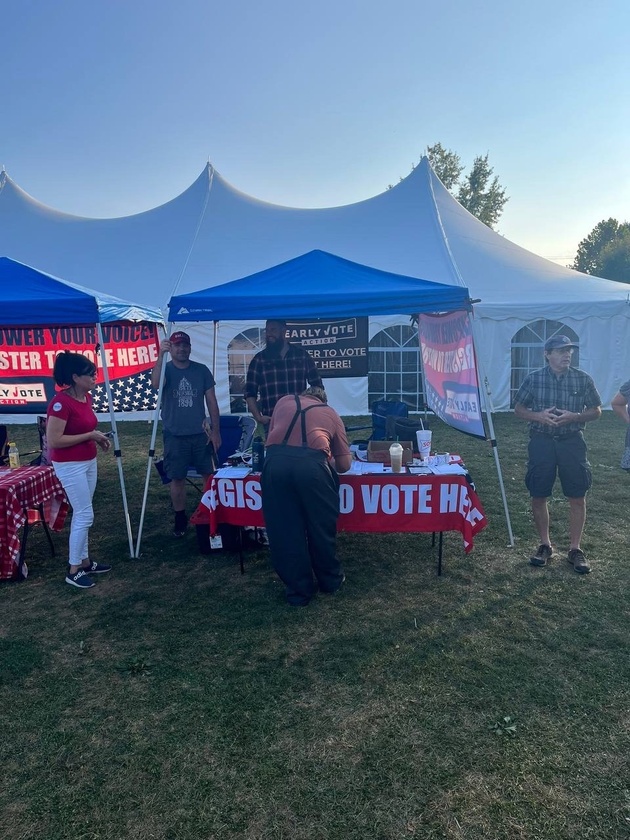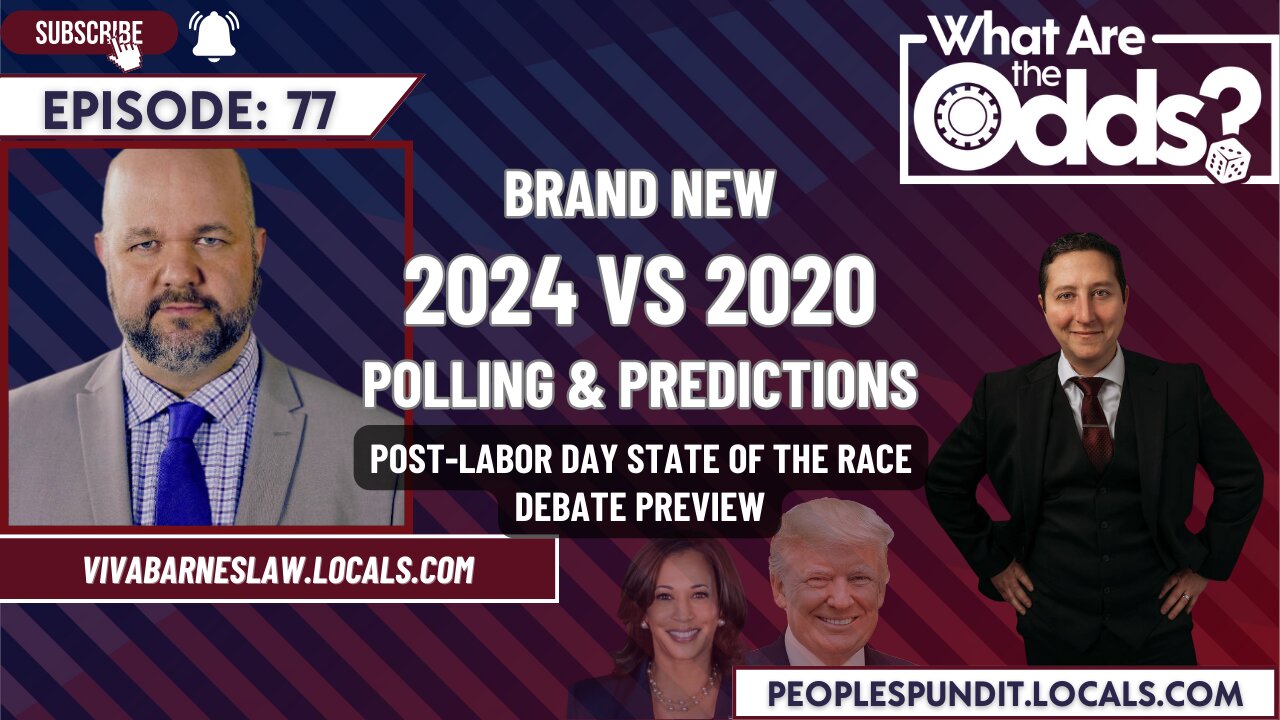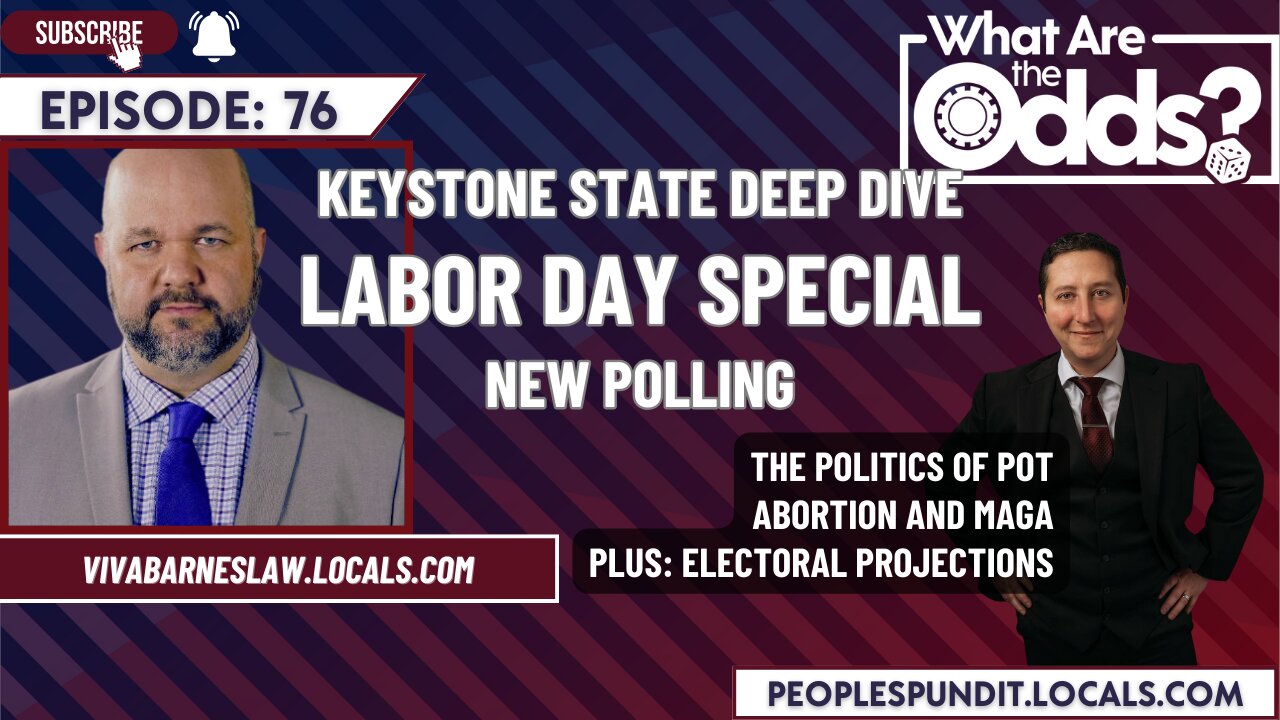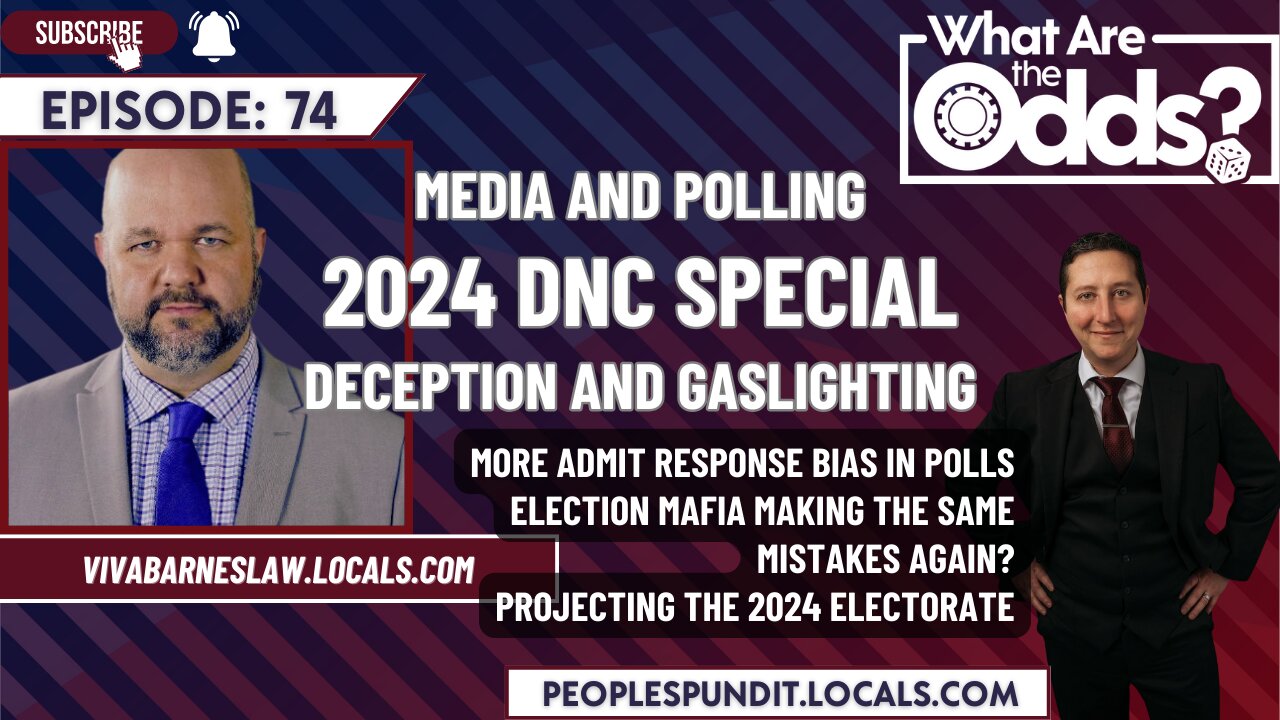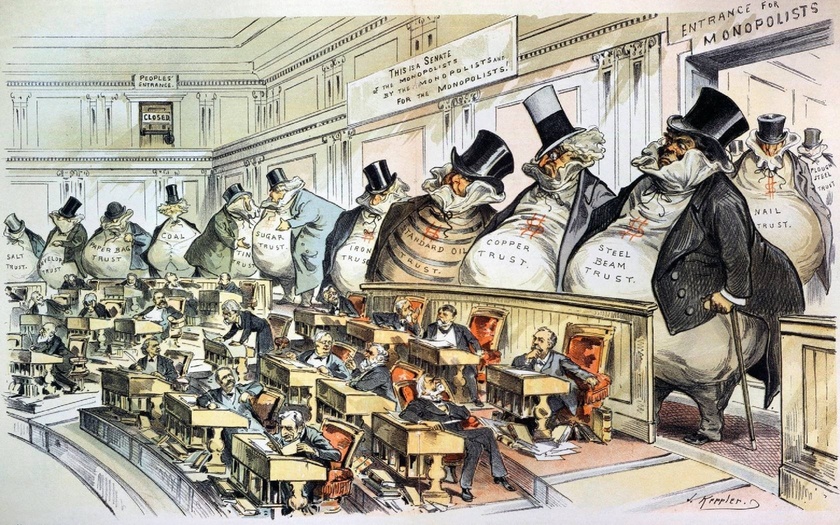
Art of the Day: The political cartoon, like its modern manifestation the meme, often best captures in a single image the deeper truths of politics and power, as this populist critique shared amongst the literate and illiterate alike more than a century ago, still captures the nature of Congress’ long loyalty – the donor class that empowers them in office and enriches them out of office.
Schedule: Past & Prospective
Past
- What Are The Odds:

Upcoming
- LIVE Friday Night Betting w/ Barnes: https://sportspicks.locals.com/post/6136522/live-betting-w-barnes
- Saturday Movie: TBD by Board Poll
- Sunday: Law for the People w/ Viva
Book Recommendation: Three Uses of the Knife by David Mamet, a revelatory book, with brilliant insights on the nature of narrative. https://www.goodreads.com/book/show/74203.Three_Uses_of_the_Knife
Wisdom of the Day: “Show me a man that gets rich by being a politician, and I’ll show you a crook.” Harry Truman.
The Merits: Top Five Curated Articles from The Barnes Library
1) Economy: The rent is still too darn high. https://www.zerohedge.com/markets/swing-state-renters-earn-17-less-needed-afford-typical-apartment
2) Politics: A Democrat talks about how the left lost Pennsylvania. https://www.realclearpennsylvania.com/articles/2024/09/19/the_pittsburgh_paradox_could_hand_pa_to_trump_1059597.html
3) Geopolitics: Biden won’t deliver peace deal for Harris. https://news.antiwar.com/2024/09/19/us-officials-say-there-will-be-no-gaze-ceasefire-deal-before-bidens-term-ends/
4) History: The first time US government officials met Voodoo. https://www.usmcu.edu/Outreach/Marine-Corps-University-Press/MCH/Marine-Corps-History-Winter-2019/Stability-or-Disruption-The-US-Marine-Occupation-and-the-Voodoo-Trials-in-Haiti-192630/
5) Culture: State Sponsored Censorship. https://www.racket.news/p/interview-on-unherd-on-state-department
Homework: Top 5 Cases TBD on Sunday
I. Magic smell searches stopped. https://www.courthousenews.com/wp-content/uploads/2024/09/illinois-supreme-court-cannabis-ruling.pdf
II. First Amendment in law school. https://www.courthousenews.com/chicago-law-professor-accused-of-racism-asks-seventh-circuit-for-another-chance-to-sue-school/
III. Adverse possession. https://tncourts.gov/sites/default/files/OpinionsPDFVersion/Majority%20Opinion%20-%20M2021-00883-SC-R11-CV.pdf
IV. Tim Pool sues Harris campaign. https://storage.courtlistener.com/recap/gov.uscourts.wvnd.58194/gov.uscourts.wvnd.58194.187.0.pdf
V. Fighting Arbitration. See Closing Argument.
Closing Argument: Compulsory Arbitration Contradicts the Constitution
- Forced arbitration fundamentally denies Americans their carefully constructed method of dispute resolution, and, as important, their right to petition the government for redress of grievances, their right to trial by jury, and their right to a public forum with public officials appointed by elected officials under Presidential appointment and Senate confirmation.
- Trials conducted in secret by officials elected and appointed by the adversarial party -- like arbitration -- mirrors the abusive British Crown: “Colonial administrators routinely steered enforcement actions out of local courts and into vice-admiralty tribunals where they thought they would win more often. These tribunals lacked juries. They lacked truly independent judges. And the procedures materially differed from those available in everyday common-law courts.” Sec. & Exch. Comm'n v. Jarkesy, 144 S. Ct. 2117, 2142 (2024) (Gorsuch, J., concurring).
- The Constitution promises public trials and transparent legal process with both a common law and Constitutional “right of access to the courts,” as a “fundamental right” protected by the substantive right to Due Process. Ringgold-Lockhart v. Cnty. of Los Angeles, 761 F.3d 1057, 1061–62 (9th Cir. 2014). In particular, “[a] fair trial in a fair tribunal is a basic requirement of due process” and “our system of law has always endeavored to prevent even the probability of unfairness.” In re Murchison, 349 U.S. 133, 136 (1955).
- While the Supreme Court justified mandatory arbitration by stating that it will “decline to indulge the presumption that the parties and arbitral body conducting a proceeding will be unable or unwilling to retain competent, conscientious and impartial arbitrators,” Gilmer v. Interstate/Johnson Lane Corp., 500 U.S. 20, 30 (1991), there is no need to presume bias: it has been proven beyond a shadow of a doubt. “[T]he arbitration system is an inferior system of justice, structured without due process, rules of evidence, accountability of judgment and rules of law.” Moseley, Hallgarten, Estabrook, & Weeden, Inc. v. Ellis, 849 F.2d 264, 268 (7th Cir.1988).
- In Gilmer, the Court sustained compulsory New York Stock Exchange Arbitration because “[t]he NYSE rules, however, do require that all arbitration awards be in writing, and that the awards contain the names of the parties, a summary of the issues in controversy, and description of the award issued” and also that its “discovery provisions, which allow for document production, information requests, depositions, and subpoena” were not shown to be deficient. Id. at 31–32. That is not the case under the AAA Employment Rules. The names of the parties may not be disclosed without their express consent. American Arbitration Association, Employment Arbitration Rules and Mediation Procedures, Rule 39(b) (hereinafter “AAA Employment Arbitration Rules”). While the rules require “written reasons for the award” there is no requirement of a summary of the issues in controversy. Id. at Rule 39(c). “[C]onformity to legal rules of evidence shall not be necessary” and the arbitrator has absolute “discretion [to] direct the order of proof, bifurcate proceedings, exclude cumulative or irrelevant testimony or other evidence, and direct the parties to focus their presentations on issues the decision of which could dispose of all or part of the case.” Id. at Rule 30. The AAA’s Employment Arbitration rules completely jettison these important features of our legal system in exchange for secretive, star-chamber proceedings conducted at the sole discretion of arbitrators who are subject to the whims of employment by large, corporate actors.
- Unlike Article III judges, appointed by the President, confirmed by the Senate and protected by lifetime tenure, arbitrators depend on their clientele to select them for future arbitrations, and thus repeat, corporate actors have undue influence on the outcome of arbitration. Article III § 1; see also Alexander Hamilton, The Federalist No. 78 (explaining that the “independence of the judges is equally requisite to guard the Constitution and the rights of individuals” from external encroachment). In fact, “[p]eriodical appointments, however regulated, or by whomsoever made, would, in some way or other, be fatal to [a judge's] necessary independence.” Stern v. Marshall, 564 U.S. 462, 501 (2011) (quoting The Federalist No. 78, at 471) (second alteration in original).
- By contrast to the Constitution's Article III, the arbitration rules expressly provide that it is the large, corporate employers who provide most of the arbitrator’s payment, not the employees. American Arbitration Association, Employment/Workplace Fee Schedule: Costs of Arbitration, (amended January 15, 2024), incentivizing arbitrators to reward the corporate interests that will reselect them. Contra 28 U.S.C. § 455 (requiring judicial disqualification when there is a “financial interest . . . or any other interest that could be substantially affected by the outcome of the proceeding”). Studies by the Stanford and Harvard Business Schools found that well-informed, repeat customers consistently successfully select arbitrators who rule in their favor. Indeed, “arbitrators display a systematic bias in awarding claims” and “industry friendly arbitrators are selected to more cases.” Egan et al., Arbitration with Uninformed Consumers, Stanford Business Working Paper No. 3768, at 36 (Oct. 2018) (hereinafter Egan, Arbitration (Stanford)). Furthermore, they found that there is a direct, negative correlation between the size of an arbitrator’s first award to an employee and the number of times the arbitrator is selected to arbitrate in the future. Id. at 56. Even ignoring the systems’ tendency to select pro-industry arbitrators, “the average arbitrator gives out an award that is 3.5 percentage points lower than what she believes is fair because doing so increases her probability of being selected for arbitration.” Egan, et al. Arbitration With Uninformed Consumers, Harvard Business School Finance Working Paper No. 19-046, (May 11, 2021) at 29 (hereinafter Egan, Arbitration (Harvard)). Indeed, the current system “induces extreme competition between arbitrators resulting in all arbitrators being maximally industry friendly.” Egan, Arbitration (Stanford) at 4. In other words, if an arbitrator wants to get repeat business, they need to rule in favor of large, industry insiders. Thus, even when both parties are well informed, “[t]he whole pool would still have a pro-industry tilt because the ex-ante chances of arbitrators being struck by an informed consumer are essentially zero.” Egan, Arbitration (Harvard) at 30. As a rule, the larger, more informed party is more likely to successfully select arbitrators which are biased in their favor. Egan, Arbitration (Stanford), at 3. The more strikes that parties have, the more power the larger, more informed party has. Indeed, limiting the number of strikes available to parties (as was done in the FINRA arbitration rules) “significantly decreased the probability that industry friendly arbitrators are selected.” Id. at 17. However, under AAA rules, each party has unlimited strikes. AAA Employment Rules, R. 12. Even in the FINRA context, where there are a limited number of strikes, “industry-friendly arbitrators are 50% more likely to be chosen from the list than their consumer-friendly counterparts.” Egan, Arbitration (Stanford) at 3. This is as compared to the already pro-industry baseline. Large corporations like Red Hat are systemically benefitted: they can winnow out arbitrators until only the most biased remain.
- This best summarize the problem: an American employee has a higher chance of being hit by lightning than winning an employment arbitration dispute with a big corporation. On average, 56 employees yearly receive awards, whereas approximately 400 Americans are annually struck by lightning. Compare American Institute For Justice, The Truth About Forced Arbitration at 7, 15 (finding that only 2.3% of all employees succeed in arbitration under AAA rules) with Jenson & Vincent, Lightning Injuries, StatPearls (February 19, 2019).
- Separate from the Jury Trial and Due Process violations, the First Amendment demands that citizens have “[t]he right of access to the courts” which “is one aspect of the right of petition.” BE & K Const. Co. v. N.L.R.B., 536 U.S. 516, 525 (2002) (quoting California Motor Transp. Co. v. Trucking Unlimited, 404 U.S. 508, 510 (1972)). Mandatory arbitration demands that American citizens waive their First Amendment rights as part of an otherwise ordinary employment relationship. A waiver of First Amendment rights “must be freely given and shown by ‘clear and compelling’ evidence.” Janus v. Am. Fed'n of State, Cnty., & Mun. Emps., Council 31, 585 U.S. 878, 930 (2018), which is rarely the case in take-it-or-leave-it arbitration clauses.
- Finally, arbitration divests Article III courts of their essential ability to review legal issues: arbitrator awards may only be reviewed for “manifest disregard” of the law, which is a largely toothless standard. Indeed, the FAA effectively creates a “phalanx of non-Article III tribunals equipped to handle the entire business of the Article III courts without any Article III supervision or control and without evidence of valid and specific legislative necessities.”
- As the Supreme Court explained, “Article III could neither serve its purpose in the system of checks and balances nor preserve the integrity of judicial decision making if the other branches of the Federal Government could confer the Government's ‘judicial Power’ on entities outside Article III.” Id. at 2314 (quoting Stern v. Marshall, 564 U.S. 462, 484 (2011)). The FAA has effectively stripped away all the “essential attributes,” Stern, 564 U.S. at 501, of the judicial power. Now, the vast majority of employment disputes are decided by pseudo-judge arbitrators whose findings of law can only be overturned for “manifest disregard” and whose findings of fact are “completely irrational.” Aspic Eng'g & Constr. Co. v. ECC Centcom Constructors LLC, 913 F.3d 1162, 1166 (9th Cir. 2019). “‘Neither erroneous legal conclusions nor unsubstantiated factual findings justify federal court review’ of an arbitral award under the FAA.” Id. (quoting Bosack v. Soward, 586 F.3d 1096, 1102 (9th Cir. 2009)). Indeed, the FAA converts Article III into rubber-stamps who “‘must’ confirm an arbitration award” outside of almost impossibly narrow circumstances. Id.
- Compelled, coerced arbitration contradicts the dispute resolution process provided for and protected by the Constitution. The Constitution preserves the “judicial power of the United States” within Article III courts, not privately enriched arbitrators. Efficiency is the excuse of the lazy jurist, not the Constitutionally honest tribunal. If efficiency were the Constitution, it would be more efficient for police to simply intrude into people’s homes without a warrant or probable cause. If efficiency were the Constitution, Article III courts should mirror the AAA’s arbitration rules and dispense with the Rules of Evidence, the Sixth Amendment, and the Seventh Amendment. The Constitution cannot “become nothing more than a game, where the Government need only identify some slight advantage to the public” so that it can trample over Constitutional rights. Jarkesy, 144 S. Ct. at 2139.
- Compulsory arbitration offends Article III’s careful construction of dispute resolution proceeding with impartial decision-makers, transparent adjudication, appellate review, evidentiary rules, and trial by jury, protected by the the First Amendment right to petition the government for redress of grievances, the Fifth Amendment right to due process of law, and the Seventh Amendment right to trial by jury. Privately enriched, secretive, star chamber proceedings conflicted by their corporate loyalties is as abhorrent to the liberties and rights of the people as the vice-admiralty courts that triggered the American revolution. A Constitutionally honest adjudicative process empowers ordinary jurors and public trials not bought-off secret arbitrations.


